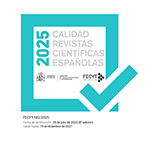Fight against Evil: Local power imaginaries during the roman conquest in the Iberian East
Abstract
The ideological discourse that supported the Iberian elites’ social pre-eminence changed dramatically with their integration in the Roman administration. In this paper, I analyse this transformation in one of its particular aspects: the fight against the Evil. During the II Punic War and thereafter, the Iberian aristocracies represented themselves as warriors defending their communities against the neighboring peoples. However, as the Pax romana was imposed over the Iberian territories, the representation of the Contestanian elites changed: they appeared in an increasing way as singular heroes that fought for their people against mythological beasts. This way, while the Iberian aristocrat become a local potentate by delegation of Rome, his image as warrior changed into his representation as a singular hero, and the danger that must be defeated was no longer the other warriors, but something more abstract and more absolute: the dark forces of Nature, represented in the Iberian iconography by the wolf or carnassier.Downloads
Article download
License
In order to support the global exchange of knowledge, the journal Complutum is allowing unrestricted access to its content as from its publication in this electronic edition, and as such it is an open-access journal. The originals published in this journal are the property of the Complutense University of Madrid and any reproduction thereof in full or in part must cite the source. All content is distributed under a Creative Commons Attribution 4.0 use and distribution licence (CC BY 4.0). This circumstance must be expressly stated in these terms where necessary. You can view the summary and the complete legal text of the licence.










